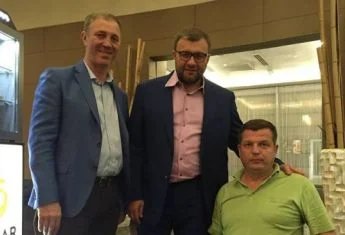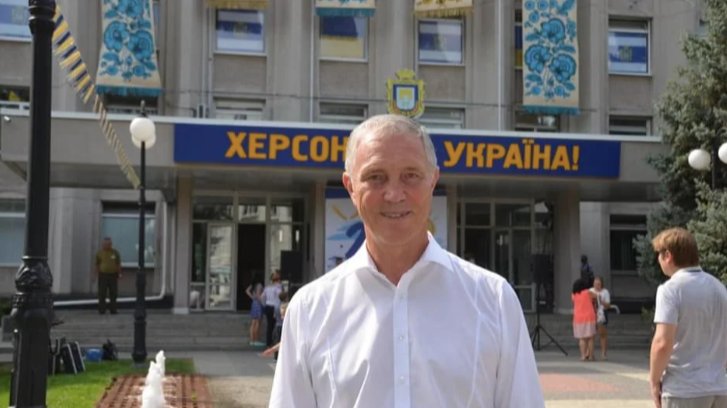Volodymyr Saldo, head of the military and civilian administration of the Kherson region appointed by Russia, has been hospitalized in Moscow. On August 5, a social media post was published on his behalf to explain that his worsening health condition is a result of post-COVID-19 complications, stress and working without days off. Later, media reports emerged claiming that Saldo was in medically induced coma and being treated by a team of toxicologists. Kherson residents began saying that the pseudo-head of the occupied territory had been poisoned.
Later, Anton Herashchenko, advisor to the Ukrainian interior minister, revealed that the chef and housekeeper are suspected of poisoning Saldo: the first signs of illness started to show just 30 minutes after the meal prepared by the new cook. The new chef was introduced to the house by the maid. Herashchenko added that the head of the “administration” had been “poisoned by an unknown substance” according to his diagnosis.
“It is ridiculous to even think that the domestic staff who are constantly watched by armed guards could do it, an incredible case of self-sacrifice. As far as I know, Saldo had been warned several times by those who installed him that he first needed to work “for a positive image” of the occupation authorities and only then he could fill up his pockets. But judging by his current state, he ignored the warnings,” a former police officer of Kherson is certain.
Citizen wanker
In 2014, a video emerged online showing a man arguing with Volodymyr Saldo in the street. The man then says, “because you are a wanker”, hits him in the head and leaves. This incident is probably the most interesting one in Saldo’s political career.
Volodymyr Saldo, 66, was born in the Mykolaiv region and graduated from the Kryvyi Rih mining institute. He served as mayor of Kherson between 2002 and 2012 and then he was a people’s deputy from the Party of Regions headed by former Ukrainian President Viktor Yanukovych for two years. Since 2014, Saldo had been dreaming of returning to the Kherson mayor’s office but only managed to win a city council member seat in 2015.
“Saldo is a very average politician with no principles who will do anything for money and power,” Kherson journalist Konstantin Ryzhenko said. “He has a dark past in politics and business. He is infamous in Khesron for several illegal business takeovers. His name is also connected to a few very suspicious deaths and none of them were investigated properly. Saldo has become a symbol of decline, economic ruin, corruption, forcible takeovers and gang violence.”
In 2005, Volodymyr Saldo faced a serious opposition at the Kherson mayor elections and was at risk of losing the office. However, his opponent Serhiy Sokolov suddenly died in a very dodgy car accident.
The press at the time was reporting, “the road at the time of collision was dry, drivers had clear view [of the road ahead]. It is unclear why the Mercedes-Benz minibus on the way to Simferopol suddenly switched to the oncoming lane where former traffic police head for Crimea Serhiy Sokolov, 45, was driving his Mazda-6 towards Kherson. Judging by the disposition of cars at the site of the accident, Sokolov pulled to the side of the road on the right trying to avoid the Mercedes. The minibus somehow ended up on the same roadside. The Mercedes driven by a Simferopol resident, 41, hit Mazda in the front with such force that even safety bags couldn’t save Sokolov from sustaining terrible injuries. The front part of Sokolov’s car was completely smashed. Meanwhile, the Mercedes driver emerged virtually unscathed.”
“Since then, other opponents of Saldo happened to die in the same fashion,” Konstantin Ryzhenko is certain. “Of course, this is a normal occurrence for Russia when people die mysteriously if they get in the way of someone in power. But these facts paint a very clear picture of him as a person.”
Ryzhenko believes that Saldo at some point either got into serious trouble or sought help of Russia’s FSB, virtually signing a sort of deal with the Devil. According to the journalist, Saldo can be deemed recruited from that moment on. Russian security service agents always had significant influence over Ukrainian politicians and were forcing them to promote certain narratives. This was what Saldo was openly doing before 2014. After the Crimean affair, he continued to do so but more cautiously.
“Saldo’s long-standing opponent Denish Pashchenko was shot dead mysteriously in Kherson,” the journalist says.
“Everybody knew that it could be his doing, but Saldo had nothing to do with it legally. A criminal case was launched but they could not prove that Saldo masterminded the crime.”
In October 2015, a support group from the so-called Donetsk People’s Republic was driven to Kherson to back Saldo at rallies. Pro-Russian politicians from unrecognized Transnistria were also lending him support.
In 2016, Volodymyr Saldo was arrested in the Dominican Republic and charged with kidnapping. He mysteriously returned to Ukraine after three months in custody.
In 2017, Saldo was photographed embracing Russian actor Mikhail Porechenkov and Ukrainian separatist Alexey Zhuravko who fled Ukraine and moved to Crimea. The politician failed to explain how and where the photo was taken.

Volodymyr Saldo, Mikhail Porechenkov and Alexey Zhuravko
When Russian forces occupied the Kherson region, Saldo was initially neither here nor there. Before the Russian National Guard and FSB agents arrived in the city, he was saying that Kherson is Ukraine. In particular, he wrote on Facebook:
“On March 13, Kherson Liberation Day, residents were always bringing flowers to the Memorial of Glory. This year, we were planning to observe this fine tradition as well. However, yesterday we received a tip that a referendum can be held to declare the creation of a Kherson People’s Republic. Different times were floating around, 10 a.m. or 12 a.m. My team and I decided to oppose and thwart this event. To achieve that, we first arrived [at the memorial] at 10 a.m. Kherson residents were already laying down flowers there. Everything was calm. We then came at 12 a.m., laid down flowers and then saw people with flags headed by [Kirill] Stremousov. We stayed and spoke before those people to harshly warn them that we would not allow even talking about creations of any republics.
On Sunday morning, even before all these events, I wrote why I would be at the park today. Yes, we could all take part in the rally on the Ushakov Avenue. Who would then stop these idiots? They want to pit those who stayed against each other through information technologies. I acted in the interests of my native city as I deemed right in this situation, specifically at the spot of the possible provocation.
I did not betray my soul. My soul is Kherson. Kherson is Ukraine.”
“It is hard to tell who is behind Saldo, security officials or gangs,” Konstantin Ryzhenko says. “This nexus has always been very vague, it is hard to catch the moment when the [criminal] activity moves from one to the other. It is almost mushed in a blender, you never know who is before you, a thug, a security agent or a two-in-one.”
Everyone is a partisan
According to Ryzhenko, there is a strong partisan resistance movement in the Kherson region now. If it was all like Putin’s intelligence was saying and the Russian agent system was doing what they were paid for, everything could be different. If traitors used the funds to boost pro-Russian sentiments, if those supervising them did not write fake reports, then the partisan movement would not be as it is now. It is also likely that the Russian Spring provocations in 2014 would have succeeded, the journalist believes.
“All vacancies published by Russian websites, saying come to Kherson to work, only probe that the local “authorities” cannot find people among the locals,
and they have to be transported here from somewhere beyond the Urals,” a Kherson resident says. “The partisan movement is everywhere. If possible, they will break your skull with a brick. But if it’s not possible to screw you over big time, they will at least spit on your back.”
“[If Saldo dies,] they will just do a reshuffle. But Saldo and Stremousov are scum and have been for a long time. They are ours, from Kherson. Pro-Russian scum with years of experience. We have known it for a while. We just won’t care about the people who will replace our scum, we won’t even remember them whether they are killed or imprisoned. However, we are looking forward to punishment for our traitors as the Second Coming,” a user named Alina wrote under the news about Saldo’s sudden hospitalization to express attitudes of a significant part of people in Kherson.
“The issue of eliminating someone who you consider as an insider is a principled issue,” Ryzhenko believes. “When your city is occupied and some military man is installed to lead it, people would be furious. And it is understandable. A complete alien who is propelled to power just because we are conquered now. And when it is conditionally someone from within, it provokes a much more aggressive reaction: ‘wait a minute, what are you doing?’ I don’t envy those who defected to Russia. I am more than sure that something will happen to each of them at some point. Their death will be much more severe and useful than the death of any foreign occupant.”
Join us in rebuilding Novaya Gazeta Europe
The Russian government has banned independent media. We were forced to leave our country in order to keep doing our job, telling our readers about what is going on Russia, Ukraine and Europe.
We will continue fighting against warfare and dictatorship. We believe that freedom of speech is the most efficient antidote against tyranny. Support us financially to help us fight for peace and freedom.
By clicking the Support button, you agree to the processing of your personal data.
To cancel a regular donation, please write to [email protected]

